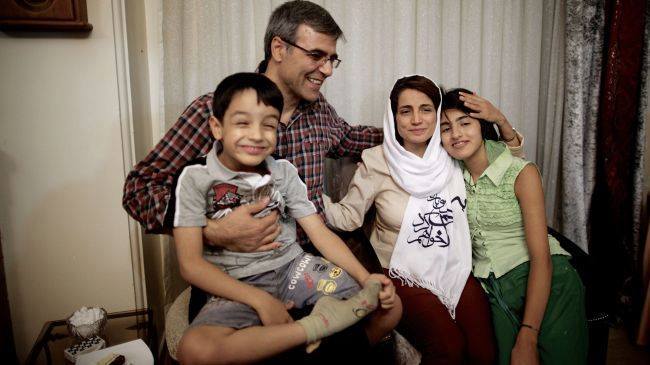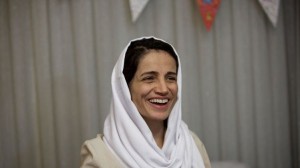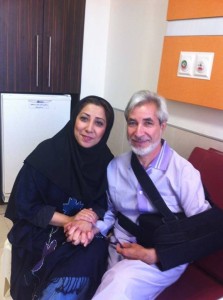The news came suddenly on Wednesday: Reza Khandan, the husband of prominent human rights lawyer Nasrin Sotoudeh, posted on Facebook that she had been released from Evin Prison after three years in detention for daring to represent her clients and to speak to foreign media.
Within hours, Sotoudeh would be telling that foreign media and Iranian human rights organizations that her freedom was not a furlough, but a permanent release: “I am not informed why I was freed, but I am free.”
Pictures of Sotoudeh with her family (above) and her wide smile confirmed the unexpected joy:
Beautiful picture of Nasrin Sotoudeh reuniting with her son after release: pic.twitter.com/43SvyDF9Pv
— Saeed Kamali Dehghan (@SaeedKD) September 19, 2013
So did an interview with CNN, with Sotoudeh immediately speaking of the need for freedom for others such as “Baha’is, political activists, and human rights activists”:
But it was not just Sotoudeh, serving a six-year sentence, who was freed. With no advance notice, fifteen other politicians and activists had their prison terms lifted.
Leading reformist Feizollah Arabsorkhi (pictured below with his wife), former Deputy Foreign Minister Mohsen Aminzadeh, former MP Taher Mousavi, journalist Mahsa Amrabadi, women’s rights activist Mahboubeh Karami, Christian convert Maryam Jalili: all were suddenly not the agents of “sedition” that the Iranian regime had proclaimed since the disputed 2009 Presidential election.
And now the big question: why?
The immediate message in Western coverage was that the releases are connected to President Rouhani’s first appearance at the United Nations next week. Wanting a contrast with his aggressive predecessor, Mahmoud Ahmadinejad, Rouhani and his Government had made a gesture towards “human rights” — thus easing the way to discussions over Iran’s nuclear issue.
That’s a fair assessment. But what if there is more?
In his campaign, Rouhani made promises that he would deal with the issue of those detained for expressing dissent and carrying out jobs like Sotoudeh’s. In his excitement, he even declared once that “all prisoners” — not just those of conscience — should be freed.
That won’t happen, of course. But the President may be willing to take on the challenge, which will include a fight with Iran’s hardliners, of releasing more politicians, activists, journalists, and students.
Already, the line is drawn.
Will Rouhani dare to free the two leading symbols of the protests after the 2009 elections and the top “seditionists” for those who repressed those protests?
Will the President — can the President — release Mir Hossein Mousavi and Mehdi Karroubi, the Presidential candidates who have been under strict house arrest since February 2011?



